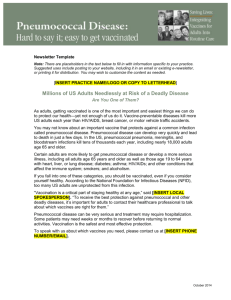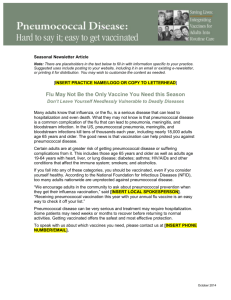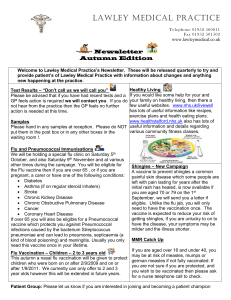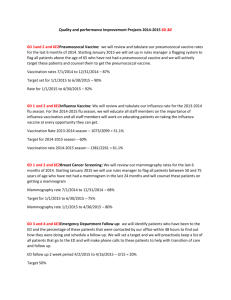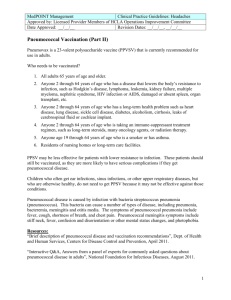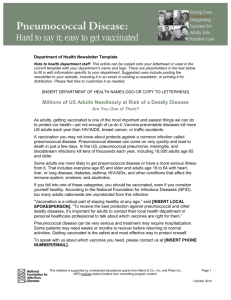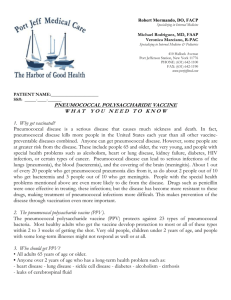Frequently Asked Questions--
advertisement
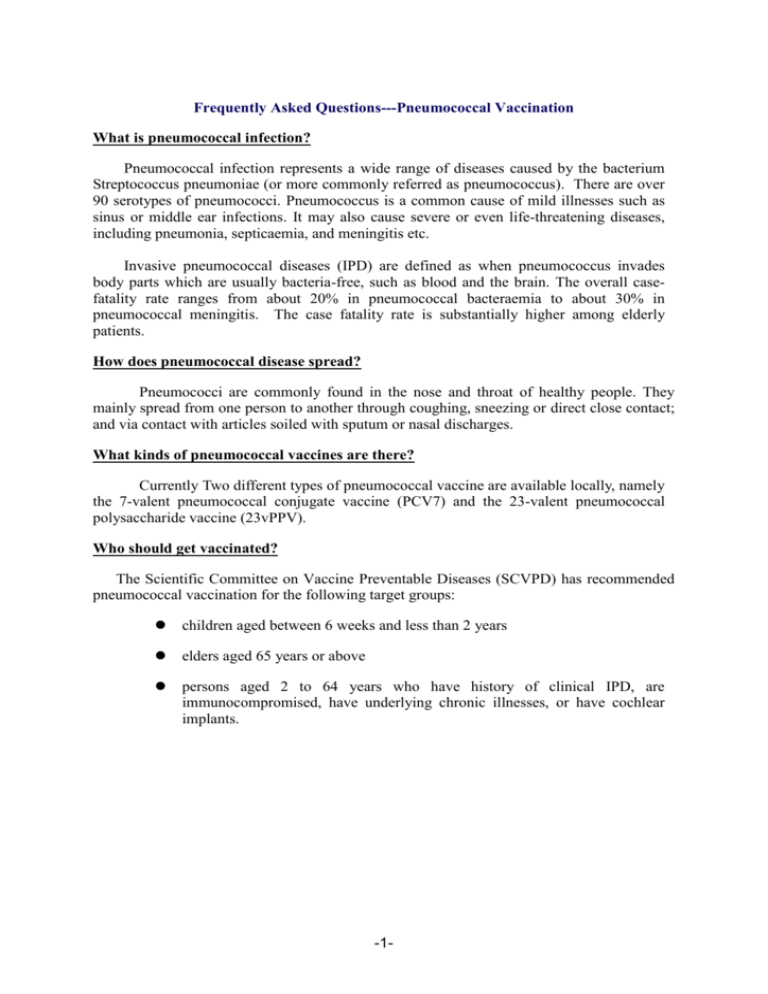
Frequently Asked Questions---Pneumococcal Vaccination What is pneumococcal infection? Pneumococcal infection represents a wide range of diseases caused by the bacterium Streptococcus pneumoniae (or more commonly referred as pneumococcus). There are over 90 serotypes of pneumococci. Pneumococcus is a common cause of mild illnesses such as sinus or middle ear infections. It may also cause severe or even life-threatening diseases, including pneumonia, septicaemia, and meningitis etc. Invasive pneumococcal diseases (IPD) are defined as when pneumococcus invades body parts which are usually bacteria-free, such as blood and the brain. The overall casefatality rate ranges from about 20% in pneumococcal bacteraemia to about 30% in pneumococcal meningitis. The case fatality rate is substantially higher among elderly patients. How does pneumococcal disease spread? Pneumococci are commonly found in the nose and throat of healthy people. They mainly spread from one person to another through coughing, sneezing or direct close contact; and via contact with articles soiled with sputum or nasal discharges. What kinds of pneumococcal vaccines are there? Currently Two different types of pneumococcal vaccine are available locally, namely the 7-valent pneumococcal conjugate vaccine (PCV7) and the 23-valent pneumococcal polysaccharide vaccine (23vPPV). Who should get vaccinated? The Scientific Committee on Vaccine Preventable Diseases (SCVPD) has recommended pneumococcal vaccination for the following target groups: children aged between 6 weeks and less than 2 years elders aged 65 years or above persons aged 2 to 64 years who have history of clinical IPD, are immunocompromised, have underlying chronic illnesses, or have cochlear implants. -1- How much protection does it offer? Pneumococcal vaccine is used for the prevention of infections, in particular IPD. Observational studies suggest effectiveness as high as 50-80% against IPD in healthy adults. How many doses of pneumococcal vaccine are required to complete a course? The pneumococcal vaccine used in Residential Care Home Vaccination Programme is 23-valent pneumococcal polysaccharide vaccine (23vPPV). For people aged 65 or above who have never received any pneumococcal vaccine or have received one dose of pneumococcal vaccine before 65 years and more than 5 years earlier, only one single dose of pneumococcal vaccine is required. For people of other age with at risk conditions, onetime revaccination may be considered 5 years after the first dose of pneumococcal vaccine. Can pneumococcal vaccine be received together with influenze vaccine? Yes. Pneumococcal vaccine can be given together with other vaccines, including influenza vaccine, but should be administered with a different syringe and at a different site. Why it is necessary for elderly to receive both influenza vaccine and pneumococcal vaccine? Vaccination with influenza vaccine and pneumococcal vaccine can prevent influenza and its complications and hence lower the risk of hospitalization and mortality among elderly people. Who should not receive pneumococcal vaccination? Severe allergic reaction following a prior dose of pneumococcal vaccine or to the vaccine component is a contraindication to further doses of vaccine. It should not be given during chemotherapy or radiation therapy for cancer. Individuals with bleeding disorders or on warfarin may receive the vaccine by deep subcutaneous injection. Those who suffer from an acute febrile illness on the day of vaccination may receive the vaccine when they recover. What are the possible side effects of the vaccine? Pneumococcal vaccine is safe. Slight swelling and tenderness at the injection site may occur shortly following injection. Local reactions are more severe following a second dose but nearly all reactions resolve within a few days without treatment. -2-
